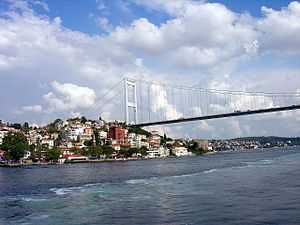Perili Köşk
_in_Istanbul.jpg)
Perili Köşk (originally known as the Yusuf Ziya Pasha Mansion and currently housing the headquarters of Borusan Holding and the Borusan Contemporary art museum) is a historical monument at the Rumelihisarı neighbourhood of the Sarıyer district in Istanbul, Turkey.
Built in 1911, the castle-like red brick mansion with stained glass windows is located close to the Fatih Sultan Mehmet Bridge, on the European shore of the Bosphorus strait. The building has 9 floors above ground level and has a gross floor area of around 5,000 m2 (54,000 sq ft).[1]
The popular nickname of the mansion, Perili Köşk (meaning the "Haunted Mansion" in Turkish) is due to the fact that its construction remained partially unfinished for a long period (its second and third floors remained empty for decades.)[2][3] The building's exterior appearance was carefully restored and completed in line with the original design between 1995 and 2000 by architect Hakan Kıran, who also renovated its interior.[2][3]
Perili Köşk is also the title of a story by the renowned Turkish author Ömer Seyfettin.
History


The mansion was built by Ottoman Vizier Yusuf Ziya Pasha, at the time a respected member of the Turkish military, for his family's accommodation.
The construction of the building started in the early 1910s. However, the construction work was interrupted due to the recruitment of the skilled workmen following the Ottoman Empire's entry into the First World War. Yusuf Ziya Pasha's second wife Nebiye Hanım and her three daughters from her first husband lived in the mansion until 1926. After the death of Yusuf Ziya Pasha, the family continued to own the mansion until the early 1990s.[4]
Renovation
The mansion was bought in 1993 by philanthropist businessman Basri Erdoğan.[2] In 1995, the renovation of the building started.[2][3] Realized by architect Hakan Kıran,[2][3] the renovation work took about five years and was completed in 2000.[2][3] The general outlook and facade of the building were kept loyal to the original design and the mansion was carefully restored with the precise materials, such as the bricks which were imported from the United Kingdom.[3]
The resale value of Perili Köşk was rated at 40 million USD by Century 21 Real Estate in 2003.[1][5][6][7]
Office building and fine arts museum
The inner space of the building was renovated to meet contemporary office standards. Borusan Holding, a conglomerate active in steel industry, telecommunications, automotive dealership, distribution and logistics leased the building on May 1, 2002 for a 25-year term to house its headquarters.[3] The holding personnel moved into the new headquarters on February 16, 2007, and an official opening ceremony was held on June 27, 2007.[4][8][9]
On December 12, 2010, it was announced that Perili Köşk would house a contemporary art museum, named Borusan Contemporary.[2] On September 17, 2011, Borusan Contemporary at Perili Köşk was opened to the public.[10]
References
- ↑ 1.0 1.1 Emporis: Yusuf Ziya Pasha Mansion
- ↑ 2.0 2.1 2.2 2.3 2.4 2.5 2.6 Homepage of "Borusan Contemporary" fine arts museum at Perili Köşk
- ↑ 3.0 3.1 3.2 3.3 3.4 3.5 3.6 "Borusan artık Perili Köşk’ten yönetilecek" (in Turkish). Hürriyet. 2007-06-20. Retrieved 2009-07-11.
- ↑ 4.0 4.1 "Borusan iş dünyasını Perili Köşk'te ağırladı" (in Turkish). Milliyet. 2007-06-29. Retrieved 2009-07-11.
- ↑ Zaman: "Boğaz'ın en pahalı yalısı 60 milyon dolar" (4 July 2003)
- ↑ Sabah: "Boğaz'ın trilyonluk incileri" (4 July 2003)
- ↑ Hürriyet: "En pahalı yapı Perili Köşk" (5 July 2003)
- ↑ Hürriyet: "Borusan artık Perili Köşk’ten yönetilecek" (20 June 2007)
- ↑ Yapı: "Borusan Artık Perili Köşk’ten Yönetilecek" (20 June 2007)
- ↑ Borusan Contemporary: Past Exhibitions
External links
- Homepage of "Borusan Contemporary" fine arts museum at Perili Köşk
- Emporis: Yusuf Ziya Pasha Mansion